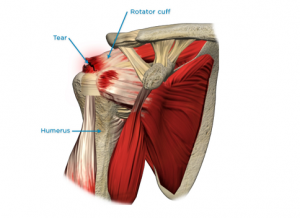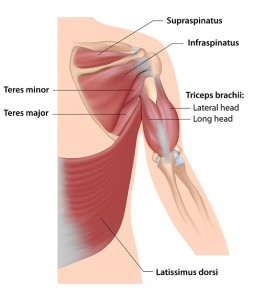Low Level Laser Therapy – A Safe, Effective & Drug-Free Resolution Option for Rotator Cuff Injuries
Experienced GP, Dr Shikha Parmar, has a special interest in providing a drug-free safe, effective treatment solution in Melbourne for acute injuries and chronic pain using Low-Level Laser light Therapy also termed Photobiomodulation or PBM Therapy.
 Treatment for Rotator Cuff Tendonitis using Low-Level Laser Therapy (LLLT)
Treatment for Rotator Cuff Tendonitis using Low-Level Laser Therapy (LLLT)
Rotator Cuff Injury including rotator cuff tendinopathy/tendonitis with or without shoulder bursitis can be successfully treated with LLLT to achieve resolution.
What is the Rotator Cuff and How Can it be Damaged?
The rotator cuff is a complex group of muscles, tendons and accompanying ligaments that stabilise the arm and shoulder and facilitate a wide range of movement. These muscles and tendons link the ball joint of the upper arm with the collarbone and the shoulder blade.
Injuries to the rotator cuff may involve one or more of its muscles or tendons.
Tears may be partial or full thickness but so long as the tendon is still attached to the bone they can be treated without surgery and with low-level laser therapy
Tendon ruptures where the tendon detaches from the bone usually require surgical intervention.
What Causes Rotator Cuff Tendonitis
Tears fall into two categories. Traumatic tears may relate to falls, dislocation, strain, lifting and injuries sustained during strenuous labour. Gradual tears, on the other hand, may occur due wear and tear or repetitive use. The supraspinatus tendon is often found to have small (less than 20mm) tears in it and is usually not the focus of shoulder’s pain and dysfunction. Such tears are common “incidental” findings in asymptomatic shoulders and can occur through wear and tear.
Tendonitis refers to the microtrauma that occurs in the tendons leading to an inflammatory or healing response by the body’s immune system in an attempt to repair it. The inflammation gets “stuck” and doesn’t progress to the repair phase

Symptoms
In the mildest cases, individuals experience soreness, weakness and limited mobility or stiffness related to the inflammation of the tendon, which is also called Tendonitis.
Shoulder Pain is aggravated during or after activity and often the Shoulder joint is stiff the next morning.
Rotator cuff injuries can be debilitating and are prone to be aggravated and re-injured during normal activities. Because the shoulder and rotator cuff are vital to many activities, it’s important to seek treatment for your condition.
How are Rotator Cuff Tears Treated?
Findings of tendon tears, especially of the supraspinatus tendon, on scans are common in asymptomatic people and don’t necessarily correlate with the pain patients present with.
Traditional treatments of rotator cuff injuries include ice, exercises, soft tissue manipulation and pain relief medication. These often fail to help for the following reasons:
Ice numbs pain but often feels unpleasant on the skin and does not inhibit pain arising from the deeper injured structures in the shoulder. More so it also restricts all important blood flow which carries oxygen and healing factors to the damaged tissue and drains away waste products. Ice inhibits the healing process.
Pain killer medication just masks pain temporarily which is appropriate to alleviate suffering but does not enhance tissue healing. Anti-inflammatory medication such as Ibuprofen and Diclofenac, used for more than even a week can cause a host of side-effects in the body and can be injurious to your health. These medications also do not improve healing and have actually been shown to slow it down.
Steroid (cortisone) injections are also used to assist in the treatment of shoulder injuries. These can be painful and the procedure carries risks such as increase in pain (“steroid flare”), tendon damage, infection etc.
Exercise and soft tissue manipulation do not heal inflamed and injured tissue and will likely aggravate the condition.
Low Level Laser Therapy utilises red and infrared light wavelengths which have been proven in scientific and clinical study to break down inflammation and stimulate a normal tissue healing response. The aim is that the inflammation of the rotator cuff tendon which has been stuck, is effectively resolved and is replaced by tissue repair, painlessly, effectively and completely safe. Click here for costs and FAQ’s.
The end result is the restoration of the healthy rotator cuff and local soft tissues. As tissues heal pain is eliminated and normal range of motion and function is restored. Muscle and tendon strength and flexibility can be addressed with graduated exercises and stretching.
To see how Low Level Laser Therapy can help your Rotator Cuff Tendonitis contact us for more information or to make an appointment.

